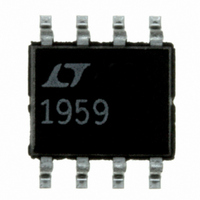LT1959CS8#PBF Linear Technology, LT1959CS8#PBF Datasheet - Page 12

LT1959CS8#PBF
Manufacturer Part Number
LT1959CS8#PBF
Description
IC REG SW 4.5A 500KHZ STDN 8SOIC
Manufacturer
Linear Technology
Type
Step-Down (Buck)r
Datasheet
1.LT1959CS8PBF.pdf
(24 pages)
Specifications of LT1959CS8#PBF
Internal Switch(s)
Yes
Synchronous Rectifier
No
Number Of Outputs
1
Voltage - Output
1.21 ~ 38 V
Current - Output
4.5A
Frequency - Switching
500kHz
Voltage - Input
4.3 ~ 15 V
Operating Temperature
0°C ~ 125°C
Mounting Type
Surface Mount
Package / Case
8-SOIC (3.9mm Width)
No. Of Outputs
1
Output Current
3.6A
No. Of Pins
8
Operating Temperature Range
0°C To +125°C
Msl
MSL 1 - Unlimited
Supply Voltage Range
4.3V To 15V
Switching Frequency Max
540kHz
Rohs Compliant
Yes
Lead Free Status / RoHS Status
Lead free / RoHS Compliant
Power - Output
-
Available stocks
Company
Part Number
Manufacturer
Quantity
Price
LT1959
APPLICATIONS
Ceramic Capacitors
Higher value, lower cost ceramic capacitors are now
available in smaller case sizes. These are ideal for input
bypassing because of their high ripple rating and tolerance
to turn-on surges. As output capacitors, caution must be
used. Solid tantalum capacitor’s ESR generates a loop
“zero” at 5kHz to 50kHz that is beneficial in giving accept-
able loop phase margin. Ceramic capacitors remain ca-
pacitive to beyond 300kHz and usually resonate with their
ESL before ESR becomes effective. When using ceramic
output capacitors, the loop compensation pole frequency
must be reduced by a typical factor of 10.
OUTPUT RIPPLE VOLTAGE
Figure 3 shows a typical output ripple voltage waveform
for the LT1959. Ripple voltage is determined by the high
frequency impedance of the output capacitor, and ripple
current through the inductor. Peak-to-peak ripple current
through the inductor into the output capacitor is:
For high frequency switchers, the sum of ripple current
slew rates may also be relevant and can be calculated
from:
Peak-to-peak output ripple voltage is the sum of a triwave
created by peak-to-peak ripple current times ESR, and a
square wave created by parasitic inductance (ESL) and
ripple current slew rate. Capacitive reactance is assumed
to be small compared to ESR or ESL.
Example: with V
ESL = 10nH:
12
I
V
P
RIPPLE
-P
dt
dI
V
V
OUT
L
IN
I
V
P-P
IN
IN
V
IN
=10V, V
ESR
L f
U
V
OUT
INFORMATION
U
OUT
ESL
= 5V, L = 10 H, ESR = 0.1 ,
dt
dI
W
U
CATCH DIODE
The suggested catch diode (D1) is a 1N5821 Schottky, or
its Motorola equivalent, MBR330. It is rated at 3A average
forward current and 30V reverse voltage. Typical forward
voltage is 0.5V at 3A. The diode conducts current only
during switch off time. Peak reverse voltage is equal to
regulator input voltage. Average forward current in normal
operation can be calculated from:
This formula will not yield values higher than 3A with
maximum load current of 4.25A unless the ratio of input to
output voltage exceeds 3.4:1. The only reason to consider
a larger diode is the worst-case condition of a high input
voltage and overloaded (not shorted) output. Under short-
circuit conditions, foldback current limit will reduce diode
current to less than 2.6A, but if the output is overloaded
20mV/DIV
0.5A/DIV
I
I
V
D AVG
P-P
RIPPLE
0 05 0 01 60
dt
dI
.
Figure 3. LT1959 Ripple Voltage Waveform
10 10 10
10 10
I
OUT
•
.
10
0 5
.
A
V
•
IN
6
V
5 10 5
IN
0 1
mV
0.5 s/DIV
.
10
V
6
OUT
P-P
6
500 10
10 10
•
•
3
9
1374 F03
10
0 5
.
6
V
V
INDUCTOR CURRENT
AT I
INDUCTOR CURRENT
AT I
OUT
OUT
A
OUT
OUT
AT I
AT I
= 50mA
= 1A
OUT
OUT
= 1A
= 50mA













